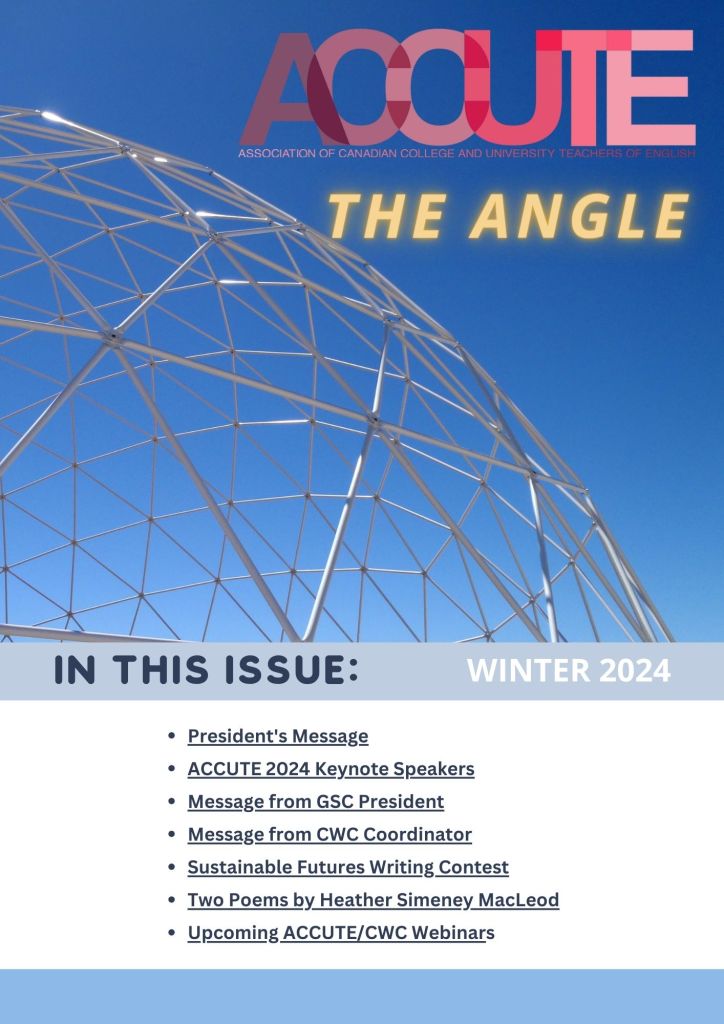EVERYTHING IS AWFUL? ECOLOGY AND AFFECT IN LITERATURES IN CANADA
Call for Papers for a special issue of
Canada and Beyond: A Journal of Canadian Literary and Cultural Studies
Issue 12, 2023
Guest editors: Stephanie Oliver and Kit Dobson
“Now, welcome to the Anthropocene
you battered, tilting globe. Still you gleam,
a blue pearl on the necklace of the planets.” – Alice Major, “Welcome to the Anthropocene”
“We want to restore balance, right relations, ethical being. We cannot afford delusional
hierarchies. We will not race each other to the bottom. We commit to live up to the future’s call.
We want our lives to not be wasted.” – rita wong, “bisphenol ache”
How might literary scholars and writers in Canada respond in meaningful ways to ongoing ecological crises? Between the crises of prairie drought, Rocky Mountain and Boreal forest fires, flooding in both Alberta and British Columbia, rapid Arctic warming, and rising sea levels, as well as politically significant ecological concerns such as logging in Fairy Creek, pipelines impacting the Wet’suwet’en, and the Site C dam on the Peace River, environmental questions are unavoidable in this moment. It becomes increasingly clear that literary critics and creative writers need to (re)train themselves to respond to the climate emergency.
This retraining, too, comes amidst a broad movement to reconceptualize writing in the place currently called Canada. Critics such as Tania Aguila-Way, Pamela Banting, Greg Garrard, Jerry Kerber, Sarah Krotz, Cheryl Lousley, Susie O’Brien, Nicole Shukin, Astrida Neimanis, Laurie Ricou and many others have shown that ecocriticism in Canada is by now an established area of study, one that is engaged in an ongoing process of reframing how criticism and writing are understood, and Ella Soper and Nicholas Bradley have argued that early writing in Canada – as well as theorizations thereof – problematically sought to understand the environment as a place of threat and danger. Leanne Betasamosake Simpson, Vanessa Watts, Zoe Todd, Adnil Gosine, Cheryl Teelucksingh, Ingrid Waldron, Beverly Jacobs, Karina Vernon, and others have also expanded the field by developing new frameworks for investigating the links between environmental risk and systemic inequities.
Building on this work and more, this special issue contends that attention is needed for literatures that engage land and environment to prompt different affects. How might literary studies engage, for instance, with popular scientific discourses that contend that natural environments link to human happiness? How might narratives of happiness and resilience be meaningfully brought to bear on the necessity of adaptation to environmental crises?
Alternatively, how might literary forms resist coercive demands for individualistic forms of resilience? How might land and environment connect to possibilities for resilience in a literary context?
Moreover, and as Cree-Métis scholar Deanna Reder argued during a session at the 2021 ACCUTE conference, Canadianists and scholars in allied fields need to be retrained in not only researching and teaching Indigenous literatures, but also indigenizing literary methods. For Reder, such retraining responds to call #62 of the Truth and Reconciliation Commission’s Calls to Action, and it can be linked, too, to the need to develop literary relationships to land that undo forms of colonial violence. How might narratives of resilience be reframed in such a context? What forms of resistance to colonial norms are needed in order to confront contemporary crises? How does literature engage in this work?
Also, and unavoidably, such retraining comes at a time when scholars and writers are navigating the “return to normal” that ostensibly comes with COVID becoming endemic – “as if that normal was not in contention,” Dionne Brand cautions. How is literature uniquely positioned to investigate what this “return” will look like? Instead of individualistic forms of adaptation, how, instead, might the literary point toward alternative, social lines of flight away from an environmentally destructive form of “return”?
In this special issue, we are interested in the following, non-exhaustive questions:
- How are notions of resilience and happiness reworked and set in dialogical interaction in / through literature?
- What are the literary affects of this moment of ecological crisis?
- What models do writers offer for thinking and feeling through these crises?
- Anthropocene, chthulucene, capitalocene, and more: how might literary works help to define this epoch?
- If “decolonization is not a metaphor” (Tuck and Yang), what does that mean for environmental literary studies, given literature’s reliance upon metaphor itself?
- How might literary works play a role in mobilizing readers’ ecological senses to incite climate action?
- What role do the senses play in representing the (complex, striated) relationships between humans, non-humans, and places at this moment in time?
- How might literature offer what rita wong terms a “syntax of hope”?
- To what will we “return” in literary studies and / or classrooms? How might we conceptualize such a return?
- (How) can literary studies in Canada (and beyond!) become an environmentally just practice?
All submissions to Canada & Beyond must be original, unpublished work. Articles, between 6,000 and 7,500 words in length, including endnotes and works cited, should follow current MLA bibliographic format. The editors also encourage alternative forms of scholarship and creative engagement. Submissions should be uploaded to Canada & Beyond’s online submissions system (OJS) (https://revistas.usal.es/index.php/2254-1179/index) and simultaneously sent to ssoliver@ualberta and christopher.dobson@ucalgary.ca by June 30, 2022. For more information please contact the guest editors at the e-mail addresses above.
This CFP is part of the work conducted within the international research project Narratives of Happiness and Resilience.
Categories: Non ACCUTE CFPs



